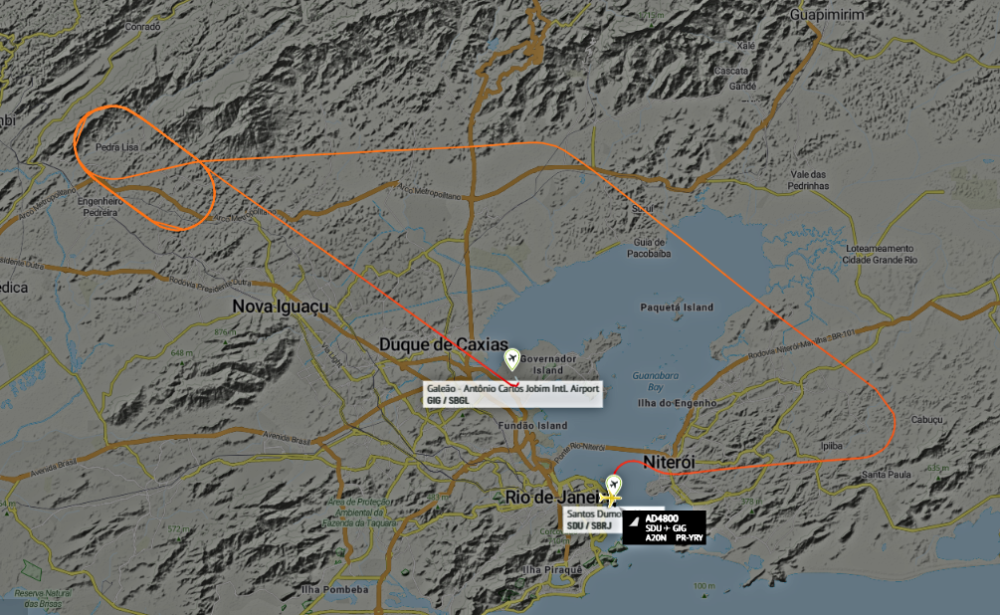An Azul Airbus departing Rio de Janeiro's Santos Dumont Airport on Monday experienced a bird strike incident. The birds damaged the plane's left engine. The incident forced the pilots to declare an emergency and land at a nearby airport.
Azul bird strike incident causes engine compressor stalls
According to a report in The Aviation Herald, An Azul Linhas Aereas Airbus A320-200N was departing Rio de Janeiro and heading to Brasilia. The report identified the aircraft as PR-YRY. That aircraft is leased and has been with Azul since January 2019. Azul regulars may know the plane better by its name Azul Avante!
The Airbus A320neo was operating flight AD4800. That flight is the scheduled 06:30 departure from Santos Dumont Airport. Normally, it takes just under two hours to fly across to Brasilia.
On Monday, the flight was on its initial climb out of Rio de Janeiro when the pilots declared an emergency. According to The Aviation Herald, the bird strike incident caused compressor stalls of the aircraft's left-hand engine.
Stay informed: Sign up for our daily and weekly aviation news digests.
Azul A320neo circles over Rio de Janerio before diverting to an alternative airport
The climb stopped at 7,000 feet. The Airbus diverted to Rio de Janeiro's Galeao International Airport and landed safely. According to flight tracking software, the flight headed out over Guanabara Bay before tracking east out over Engenho do Rocado. The flight then turned northwest in a sweeping turn over Engenho Novo before tracking back over the bay north of Paqueta Island.
Over Parada Angelica, the plane turned onto a westerly tracking and entered into a series of circles over Pedra Lisa. Coming out of the circles, the aircraft headed southeast over Duque de Caxias on a tracking into Rio de Janeiro's Galeao International Airport.
Watching the climb, the Airbus leveled off at just under 5,000 feet just minutes into the flight. For approximately five minutes, the plane maintained that altitude before climbing to 7,000 feet. At this point, the aircraft leveled off, maintaining that altitude while it overflew the bay and circled above Rio de Janeiro's suburbs.
On its run into Galeao International Airport, the Airbus lost altitude fairly quickly before coming into land safely. The plane spent just under 40 minutes in the air.
Several incidents involving Azul's A320-200neos this year
Monday's incident is the first recorded incident regarding PR-YRY. Azul has a fleet of 42 Airbus A320-200neos, the majority of which are in the air. The São Paulo-based airline has had a steady stream of incidents this year concerning its A320-200neos.
Those incidents include an in-flight engine shutdown in early January on an A320-200neo flight from Cruz to Sao Paulo Congonhas. In mid-February, smoke was reported in the aft cabin on an A320-200neo flight from Sao Paulo Viracopos to Salvador. Just days later, another A320-200neo reported a drop in oil quantity in an engine and diverted the plane to Salvador.
In early March, a smell akin to burning electrical wires was reported on an Azul A320-200neo flight from Sao Paulo Viracopos to Aracaju. That flight also diverted. One month later, in early April, another Airbus A320-200neo reported engine vibration indications in-flight, prompting a return to Manaus. In late April, another A320-200neo operating an Azul flight from Curitiba to Rio de Janeiro Santos Dumont reported a hydraulic failure. That forced the aircraft to divert to Galeao International Airport.
In all incidents, including Monday's bird strike incident, the flights landed safely without any reported injuries to passengers or crew.



